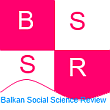A Tradition of Honor, Hospitality and Blood Feuds: Exploring the Kanun Customary Law in Contemporary Albania
Abstract
The following paper explores the contemporary Albanian society, as a reality which is at a crossroads between modernity and tradition, where old values and new ambitions live side by side. To elaborate on this, the research refers to the code of customary law presented in the Kanun of Lekë Dukagjini, an ancient statute at the basis of Albanian culture. The Kanun is analyzed both as a code of customary law and as a frame of reference for social behavior that constitutes Albanian identity. The code represents the body of traditional law and has been orally transmitted from generation to generation, existing in an unwritten version throughout centuries and governing the most important aspects of the social structures. The Kanun represents the oldest Albanian jurisdictional system. This research is relevant from both a sociological and juridical point of view. The study examines the role played by the ancient customs in the current reality, such as the private justice practice based on the blood feuds' tradition. Although many prescripts contained in the Kanun might appear today as obsolete and archaic, blood feuds are still present and represent a social wound in the current dynamic of Albanian society. The analysis follows a deductive approach, specifically focusing on the pillars of Lekë Dukagjini's Kanun: the word of honor, hospitality and blood revenge.
Key words: Albania; Customary Law; Tradition; Honor; Hospitality; Blood feuds.Downloads
References
Cozzi, Ernesto, 1910, ''La vendetta del sangue nelle montagne dell Alta Albania'', in Anthropos, Bd. 5, H. 3. Anthropos Institute, pp. 654-687.
Durham Mary Edith, 1909, High Albania, Edward Arnold, London.
Durham Mary Edith, 1910, High Albania and its Customs in 1908,Royal Anthropological Institute of Great Britain and Ireland,40:453-72, London.
Elsie Robert, 2010, Historical dictionary of Albania, Scarecrow Press Inc, Lanham.
Fishta Gjergj, 2001, ''Introduction'' in Kanuni I Lekë Dukagjinit by Shtjefën Gjeçovi, Kuvendi Tiranë.
Fox Leonard, 1989, The Code of Lekë Dukagjini, Gjonlekaj, Publishing Company, New York.
Hasluck Margaret, 1954, The Unwritten Law of Albania, Cambridge University Press, Cambridge.
Kadare Ismail, 1988, Doruntine, New Amsterdam Books, New York.
Kadare Ismail, 2003, Broken April, Vintage Classics, London.
Tarifa Fatos, 2008, ''Of Time, Honor and Memory: Oral Law in Albania'', Oral tradition vol.23, Issue 1:3-14.
Vickers Miranda,1999, The Albanians:a modern history, LB.Tauris & Co Ltd, London.
Villari Salvatore,1941, Le consuetudini giuridiche dell'Albania nel Kanun di Lek Dukagjin, Società editrice del libro italiano, Roma
Voell Stéphane, 2003, ''The Kanun in the City: Albanian Customary Law as a Habitus and its Persistence in the Suburb of Tirana, Bathore'', in Anthropos, Bd. 98, H. 1. pp. 85-101, Anthropos Institute.
Yamamoto Kazuhiko, 2005, The Ethical Structure of the Kanun and its Cultural Implications, Melosi Design, New York.
Permissions
Authors are expected to obtain permission from copyright holders for reproducing any illustrations, tables, figures or lengthy quotations previously published elsewhere. BSSR will not be held accountable for any copyright infringement caused by the authors.
Copyright
The content offered in the BSSR remains the intellectual property of the authors and their publishers respectively. University “Goce Delcev”- Shtip, R. Macedonia and BSSR keap the right to promote and re-publish the texts.



